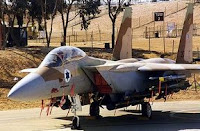 According to an article in the January 7, 2007 edition of the British newspaper The Sunday Times (read article), Israeli military officers have developed plans to attack Iranian nuclear research and development facilities using tactical nuclear weapons.
According to an article in the January 7, 2007 edition of the British newspaper The Sunday Times (read article), Israeli military officers have developed plans to attack Iranian nuclear research and development facilities using tactical nuclear weapons.
Reportedly, the Israelis will attack three targets in Iran that comprise the critical elements of the nuclear program, setting back the weapons effort for years. The three targets are the uranium enrichment facility at Natanz, the uranium conversion facility at Esfahan, and the heavy water reactor at Arak. The fact that two of the three targets are involved in uranium processing and the other in plutonium production, indicates that Iran is pursuing at least two different avenues to obtain fissile material suitable for use in thermonuclear weapons.
When I was in Israel a few months ago, senior Israeli officials told me that they believe the next year would be critical in stopping the Iranian program, because they believe that in two years the Iranians will have produced enough fissile material - probably enriched uranium, but possibly plutonium as well - to build nuclear weapons (see my earlier article, Iran - The "Existential Threat" to the State of Israel).
If the Israelis believe that international diplomacy will not succeed in deterring the Iranians from attempting to develop a nuclear weapon, it is reasonble to assume that they will take military action. They have limited capability to do so with a high probability of success, but if they truly believe - and I think they do - that the very existence of their country is at stake, they will try. Their best and only realistic option is an air strike.
According to the article, the strike planning involves the use of tactical nuclear weapons, each with about a one kiloton yield (the Hiroshima bomb was about 15 kilotons). In my opinion, a one kiloton device may technically be a "tactical" nuclear weapon, but in the world of political reality, there is no such thing. Any use of a nuclear weapon, the first since the United States dropped two atomic bombs on Japan in 1945, will draw international condemnation and brand Israel as a pariah nation. Add to this the U.S. sanctions required by law once a country cannot be certified as nuclear weapons free. Israel has skirted the nuclear issue for years with its policy of "nuclear ambiguity" - use of a tactical nuclear weapon in Iran removes that ambiguity (see my earlier article, Israel's Nuclear Weapons).
Israeli pilots have reportedly flown training flights over the Mediterranean as far as Gibraltar in recent weeks to train for the 2,000-mile round trip to potential Iranian targets. All well and good, but flying over the Mediterranean is not flying that same distance through hostile airspace. My previous assessment of Israel's air strike options is still valid (see Iran - Israel's Air Strike Options).
One should also consider that this information may have been intentionally leaked or planted as part of an information operations campaign to influence Iranian thinking, or to stiffen European and American resolve to deal with this issue diplomatically. Thus far, Tehran is not listening.
The bottom line here: Use of tactical nuclear weapons is an absolute last resort. Doing so removes any doubt about Israel's nuclear arsenal, invites sanctions and runs the risk of igniting a regional war. On the other hand, doing nothing puts the existence of the state of Israel at risk. When faced with possible extinction, the Israelis may well opt to go nuclear.
skip to main
|
skip to sidebar
Twitter
.jpg)
An acknowledged Middle East expert, dynamic speaker, author of Ally to Adversary - An Eyewitness Account of Iraq's Fall from Grace, retired intelligence officer and recovering CNN and NBC military analyst Lt Col Rick Francona offers his thoughts and opinions on various Middle East topics.
Recommended by TIME.com, CNN.com, MSNBC.com and the Chicago Sun-Times.
Visit Rick's website
Index of Articles

View on your smart phone
Help defray our expenses to produce this commentary
.jpg)
An acknowledged Middle East expert, dynamic speaker, author of Ally to Adversary - An Eyewitness Account of Iraq's Fall from Grace, retired intelligence officer and recovering CNN and NBC military analyst Lt Col Rick Francona offers his thoughts and opinions on various Middle East topics.
Recommended by TIME.com, CNN.com, MSNBC.com and the Chicago Sun-Times.
Visit Rick's website
Index of Articles
Mobile browser

View on your smart phone
Archives
-
▼
2007
(
130
)
-
▼
January
(
18
)
- NBC Today Show - January 30, 2007
- Quoted in: Israeli Realism on Iran Belies Threat R...
- The Kurds: Between Iraq and a Hard Place
- Iranian Qods Force in Iraq: Treat them like al-Qaida
- 'Ashurah - Shi'a holy day...and target for the Sunnis
- Surge in Iraq - Treat the disease, not the symptom
- Kirkuk - Tinderbox in the north
- The Qods Force - Iran's special operations force
- "Iraq for Land" - This might work, except...
- Muqtada Al-Sadr: He has to go
- Hoshyar and I - the Iraqi foreign minister on dete...
- Finally, Al-Maliki steps up to the plate (we hope)
- U.S. Troop Surge in Iraq - Over to you Al-Maliki...
- Analysis - Israeli plans for attack on Iranian nuc...
- The coming battle with the Al-Sadr militia
- Iraq and 9/11 Deaths - Faulty Analogies
- Iraq: Halabjah Revisted
- Robert Fisk - again
-
▼
January
(
18
)
